Ivy Day, when all of the Ivy League schools release their admissions decisions, was on March 28 this year. As we move into April, all of the top colleges are sending out letters to eager students, and releasing more broadly their acceptance statistics for this year’s class of applicants.
In this article, we’re going to examine acceptance rates for top 20 colleges, and see how they compare to previous years. We’ll point out trends, and look at how this impacts the broader admissions landscape. College admissions has been competitive for a while, but knowing just how competitive it is can help you accurately assess your own chances of acceptance. Let’s jump in!
Ivy League Acceptance Rates
This was a historic year for the Ivy League. In one remarkable trend, we saw application numbers drop slightly for Harvard and Brown, though they grew elsewhere, with UPenn, Yale, and Dartmouth all seeing a record number of applicants. Some of this flux is normal, but some also follows the trends of news or admissions.
The Supreme Court case centered on Harvard’s admissions practices brought them significant negative attention. While this might not be solely responsible for their slight decline in applications, we believe it was a factor. We also expect application rates to decline at some schools going ahead, as test optional admissions end for some top colleges, notably Yale and Dartmouth.
For reference, here are the admissions statistics for all Ivy League schools for the class of 2028:
| School | Number of Applicants | Acceptance Rate |
| Brown | 6,244 ED, 42,637 RD | 14.4% ED, 3.8% RD |
| Columbia | 60,248 total | 3.9% total |
| Cornell | TBA | TBA |
| Dartmouth | 31,657 total | 5.3% total |
| Harvard | 54,008 total | 3.6% total |
| Princeton | TBA | TBA |
| UPenn | TBA | TBA |
| Yale | 57,465 total | 3.7% total |
Sadly, not all of the Ivy League schools have released their results yet, nor do we have granular details. UPenn, for instance, admits students by college, but rarely releases any breakdown in admissions statistics by college. WHile this is disappointing, it is not necessarily surprising.
Colleges are loathe to provide a detailed look behind the curtain, to pop the hood on college admissions and give a detailed look inside. In addition, admissions offices are very busy this time of year, and compiling statistics may not be their top priority. This makes sense, and we sympathize, even as we look eagerly for these same statistics.
Other Top Acceptance Rates
Of course, there are more colleges than just those in the Ivy League. These schools are often just as competitive, if not more so for admissions. Here are the admissions results for the class of 2028 which have been released by the other Top 20 colleges:
| School | Number of Applicants | Acceptance Rate |
| Caltech | TBA | TBA |
| Duke | 54,190 total | 3.7% total |
| Johns Hopkins | 38,000+* | 6.7% |
| MIT | 28,232 total | 4.5% total |
| Northwestern | 50,000+ | ~7.5% |
| Notre Dame | 29,943 | 11.1% |
| Stanford* | TBA | TBA |
| Rice | 32,459 | 7.5% |
| UC Berkeley | TBA | TBA |
| UCLA | TBA | TBA |
| UChicago | ~43,000 | ~3.7% |
| Vanderbilt | 47,171 | 5.1% |
Johns Hopkins has not yet released exact admissions numbers; while they did release the number of accepted students, we are uncertain of the exact number of applications they received. Northwestern released their projected acceptance rate, but not the exact number of applicants or admitted students.
Stanford traditionally does not release any admissions data until the release of the Common Data Set, so it will be a few months before we have hard data on their acceptance rate this year.
Each college has their own policies when it comes to collecting and releasing this data; most do so through news releases that are meant to celebrate the accomplishments of the incoming class, while also subtly (or not so subtly) promoting the university as a whole.
What Does This Data Tell Us?
There are patterns we can pick out from this data, both about individual schools, and admissions as a whole. For example, the University of Chicago admitted fewer students this year than last, and fewer still than the year before that. Indeed, they only admitted 1,800 students this year. The exact reasons for this are uncertain; we only know what they did not why. Our best guess is either they overenrolled students in a previous year by miscalculating their yield, and are now trying to balance it better. They could also be trying to manipulate yield and acceptance rates through creative use of the waitlist, though we need to wait for the Common Data Set to release before we know this.
An overall trend that emerges is the continued importance of early decision admissions. Colleges which offer early decision are admitting around half of their entire incoming class through the early round on average, with some even higher. The number of early decision applicants is also trending upwards, though it still lags behind the number of students who apply regular decision.
Schools which ended test optional policies saw slight drops in the number of applicants they received, as many predicted. As we look ahead, more schools are ending their test optional policies, which may see application rates slack at some of these schools.
We have not seen any repeats of the major dips in acceptance rates which occurred during the pandemic, but this makes sense. There isn’t much lower that rates can crater, and there are no commensurate disruptions to the world around us to impact students and colleges.
While not all colleges have released their results yet, we anticipate most following these same trends. We anticipate dropping acceptance rates at flagship state schools, especially those in the top 50, like UNC Chapel Hill and UT Austin. As admissions grows more competitive at top private colleges, increasing numbers of students are staying closer to home, especially when they have great options for in-state colleges.
This is especially true for schools like UT Austin which have guaranteed acceptance policies. Their pledge to accept every student at a public Texas high school in the top 6% makes them an alluring option now that many of these students see Harvard and other top colleges slip further out of reach.
Final Thoughts
Not all of the admissions statistics are out for the class of 2028 are out yet, but we already have an emerging picture of the college admissions landscape. Admissions remain exceedingly competitive, with many colleges letting in a historically low percentage of applicants. This, of course, raises the stakes for juniors who are just now beginning their college admissions journey. After all, they’re going to be playing these odds soon, and they don’t seem to be in their favor.
This is where Ivy Scholars can help. College admissions is unnecessarily stressful and confusing for students and parents alike, and having an experienced guide can help alleviate both problems. We helped scores of students get into their top choice college in 2023, and are more than familiar with the challenges they faced in doing so. If you want to hear how we can help you, schedule a free consultation today.








